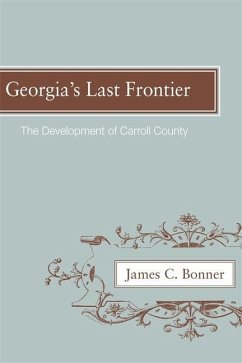Published in 1971, "Georgia's Last Frontier "presents the history of one of the state's least developed regions. During the 1830s, Carroll County was a large part of Georgia's most rugged frontier. James C. Bonner examines how life in this isolated region was complicated by the presence of Native Americans, cattle rustlers, and horse thieves. He details how the discovery of gold in the Villa Rica area resulted in drunkenness and violence, but also laid the foundations of mining technology that were later used in Colorado and California. The region remained isolated until after the Civil War, when a rail line was constructed to stimulate cotton cultivation. With the development of the railway, Carroll County's frontier traditions waned in the early twentieth century.
Hinweis: Dieser Artikel kann nur an eine deutsche Lieferadresse ausgeliefert werden.
Hinweis: Dieser Artikel kann nur an eine deutsche Lieferadresse ausgeliefert werden.

